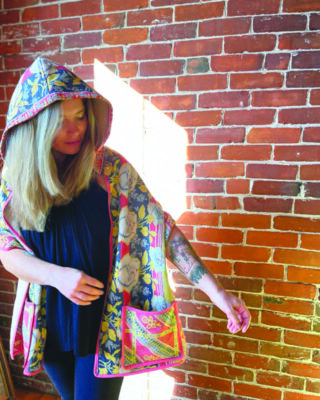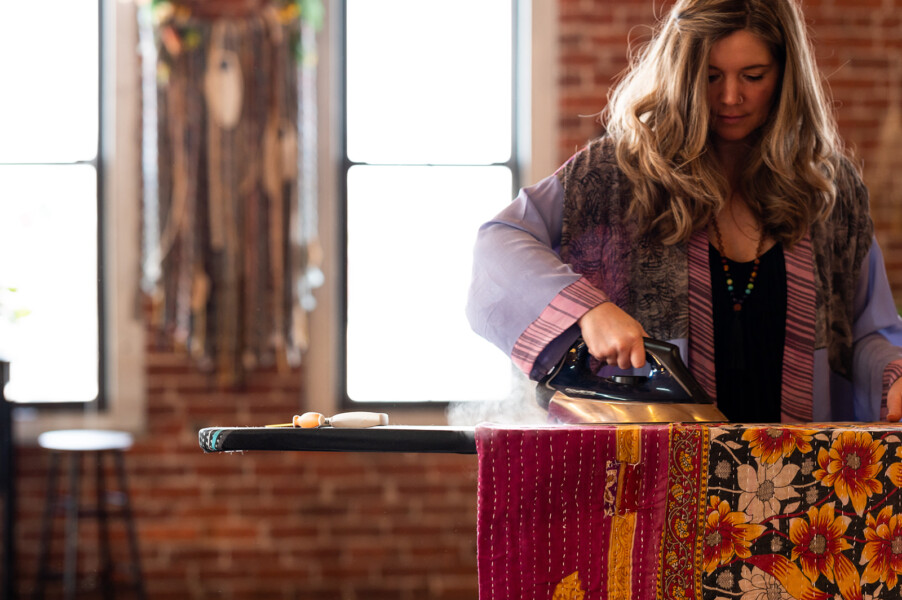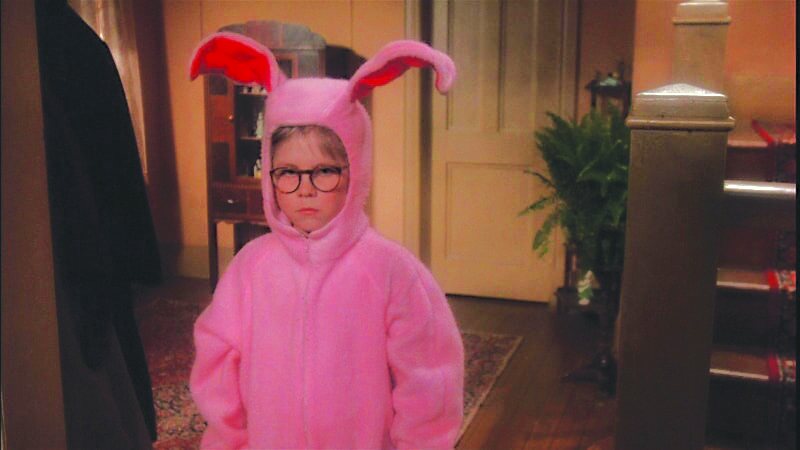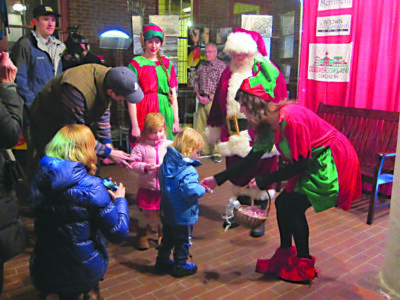How upcycled pieces and secondhand finds give clothes and jewelry their next fashion moment
Out with the old, in with the “new”
Upcycling used clothing into fresh fashion
By Matt Ingersoll
Margaret Kasper of Milford was upcycling clothes before that was even a common term.
“My grandmother was a quilter, and I used to watch her save every scrap of fabric that she would use to make her quilts and then reuse it in new quilts. And I think that kind of stuck with me,” said Kasper, who has owned Mountain Girl Clothing since 2008. “I started to do the same thing when I got into sewing. I would save all the discarded pieces of fabric and use them on a new piece further down the line. … I think ‘upcycling’ is a pretty new term, and now it’s pretty trendy, but I think people have been doing it forever and probably not even realizing they’re doing it.”
A Milford native, Kasper studied fashion and textile design at Massachusetts College of Art and Design in Boston. Launching Mountain Girl Clothing with her grandmother’s hand-me-down sewing machine, she began exploring the world of gently used and discarded textiles. Today, she operates in her own studio space in downtown Milford with the help of two assistants.

“There are literally tons and tons of post-consumer waste textiles and discarded clothing that you can find at thrift stores and secondhand stores and things like that,” Kasper said, “and so that’s what I really started to dive into, was looking at what I could use around me that’s not going to cost an arm and a leg. Then I would start to take it apart, transform it and make new pieces of clothing. … People just responded to it really well. Going into thrift stores is kind of like Christmas for me, because you never know what you’re going to find.”
Kasper admitted that when she’s on the hunt for “new” pieces of old clothing she can use at thrift stores, she doesn’t always have the most immediate idea of what she is going to do with it.
“I’ll be attracted to the feel or the print of the fabric,” she said, adding that Mountain Girl Clothing primarily specializes in women’s shirts, jackets, sweaters, hoodies and similar articles.
In addition to shopping at secondhand and thrift stores, Kasper has worked with a family in India for the past few years, whom she became connected with through the e-commerce website Etsy.
“They’ve been sending me their discarded textiles from India, and so I’ve been able to kind of expand what I use for materials and bring that over here to use in my pieces,” she said.
With the help of her two studio assistants, Kasper can produce about 40 to 50 new pieces every week — on average, she said, that’s anywhere from a half hour to up to two hours per piece. Once it’s ready to go, she’ll often have a model come in and wear it, or she’ll model it herself, and they’ll take pictures and create a listing for the item on the website. On Thursdays, Kasper also usually presents a shop launch on social media for her regular customers.
New to the world of upcycling, Sofia Farah launched The Tenth String Co. roughly eight months ago in her basement studio in Nashua. In fact, Farah actually just learned how to use a sewing machine in 2020, when she made masks during the early months of the pandemic.
Farah’s first upcycled project was a denim jacket, but it was one she had made just for herself.
“I posted it on my Instagram after it was done, then I went about my day and I get back on Instagram and get a ton of [messages], which doesn’t ever happen,” she said. “People were obsessed with the denim jacket and they all wanted to buy it. So then I was like, ‘What if I start doing this,’ and so I went to the thrift store that week and just found a bunch of random things.”
Upcycling started as a part-time hustle for Farah, until eventually she quit her job to wholly focus on keeping up with her orders. She is also now one of about 30 vendors that are participating in the inaugural Holiday Shoppes at Tuscan Village in Salem — find her there every Thursday through Sunday through Dec. 31, and daily during the week of Christmas.

“One of my more popular items is the shirt and flannel combo,” Farah said. “Basically I take the torso of a shirt that might have some graphics on it, and I sew flannel arms to it, and it kind of makes this super-relaxed boxy-type fit article of clothing. … It’s the comfiest thing ever. You don’t have to button up the flannel, which is awesome. You just throw it on.”
Like Kasper, Farah finds herself often going to thrift and secondhand stores, as well as a lot of estate sales. She has even developed relationships with some local vintage clothing dealers.
In Salem, Ianna True owns and operates Fits the Vibe, a modern secondhand store that also carries some vintage and upcycled items. The business originally opened in Windham in October 2020 before moving to a larger space in Salem the following year.
True, who taught herself how to sew, also likes to create articles of clothing from graphic T-shirts and flannel sleeves, and she’ll sometimes dabble in upcycling sweatpants and sweatshirts.
Even some items like bed sheets and shower curtains can be upcycled into clothing. Meredith artist Cassandra “Sanni” Reale of Monarch Press Collections has filled such orders since founding her business in early 2021. She also likes to implement block printing into her work.
“That’s what makes me stand out a little bit more than just doing certain sewing alterations, is I’ll add that printing aspect in there, and a lot of it is some of my own designs,” Reale said. “Some of the bigger projects that I’ve done have been … flipping quilts into jackets, and also printing designs on the backs of jackets, or on pants or whatever.”
Kasper believes her customers are drawn to her pieces for several reasons. There’s the environmental benefit of reducing the amount of wasteful materials, for instance, in addition to the excitement among her buyers for being able to wear something wholly different and unique.
“I’ve always loved that you can find a T-shirt at a thrift shop and it’s sad and it doesn’t have a home, and then you add something to it or cut it a certain way and it looks like a completely new piece of clothing. And you didn’t have to go to a big department store to find it,” she said. “Another cool thing about the upcycling process is that it makes these pieces of clothing truly one of a kind. It’s something you can’t find anywhere else and can’t really be replicated.”
Where to find locally upcycled clothing
Here are a few local companies that work to breathe new life into yesterday’s clothes.
Fits the Vibe
287 Lawrence Road, Salem, 818-0598, fitsthevibe.com, and on Facebook and Instagram @fitsthevibe
A modern secondhand store that also carries vintage and upcycled items, Fits the Vibe originally opened in Windham in October 2020 before moving to a larger space in Salem the following September. Owner Ianna True works with dozens of small businesses to source their products in the store, which include everything from jewelry to upcycled clothes.
Monarch Press Collections
Meredith, monarchpresscollections.com, and on Facebook @monarch.press and Instagram @monarchpresscollections
Specializing in upcycled clothing, eco-friendly stamp making, block printing and more, all with a focus on sustainability, Monarch Press Collections was launched by Meredith artist and University of New Hampshire grad Cassandra “Sanni” Reale in early 2021. Her work is available for sale online, and she’ll also be selling her work at Wayfarer Marketplace (626 Main St., Laconia) on Friday, Dec. 16, from 9 a.m. to noon.
Mountain Girl Clothing
Milford, mountaingirlclothing.com, and on Facebook and Instagram @mountaingirlclothing
Milford native Margaret Kasper has owned and operated Mountain Girl Clothing since 2008, specializing primarily in women’s shirts, jackets, sweaters, hoodies and similar articles. While her downtown Milford studio space isn’t open to the public, Kasper usually presents a weekly shop launch on social media for her regular customers, and she ships her products worldwide.
The Tenth String Co.
Nashua, thetenthstringco.com, and on Facebook and Instagram @thetenthstringco
New to the world of upcycling, Sofia Farah of The Tenth String Co. works out of her basement studio in Nashua. Find her at the inaugural Holiday Shoppes at Tuscan Village (9 Via Toscana, Salem) every Thursday through Sunday through Dec. 31 (except Sunday, Dec. 25) — hours are Thursday and Friday, 4 to 8 p.m., Saturday, 11 a.m. to 8 p.m. and Sunday, noon to 7 p.m. From Sunday, Dec. 18, through Friday, Dec. 23, the Holiday Shoppes will also be open daily, 11 a.m. to 8 p.m., and they’ll be open Saturday, Dec. 24, 11 a.m. to 4 p.m.
Thrill of the hunt
Secondhand clothes shopping offers exciting finds
By Angie Sykeny
Shopping secondhand can be a budget-friendly way to grow your wardrobe, but saving money isn’t the only good reason to stop in a local consignment boutique.
“To me, the thrill of the hunt itself is just as exciting as the bargain or the item,” said Elyssa Alfieri, owner of Lilise Designer Resale in Concord. “You’re gaining access to a unique selection of items … with the opportunity to shop many stores, regions, time periods and aesthetics, all in one place, and there is so much room for experimentation to find your truest self.”
At LDR, you’ll find women’s and men’s secondhand clothing, shoes, accessories and jewelry, including items from everyday brands like Madewell as well as high-end brands like Chanel, Gucci and Burberry.

“We work hard at curating our selection … and assess each and every item for condition, age, style, fabrication, authenticity and value,” Alfieri said. “We focus on … items from the highest-end brands possible, but we also can’t ignore the ‘it factor’ — when an item is good, it’s good.”
For customers, she said, that carefully curated selection provides a shopping experience that is “all needles, no haystack.”
“We cater to those who feel underserved by what traditional retail models offer,” Alfieri said. “We are for the people who can’t find trends early enough, for people who don’t have time to scour the thrift store racks. … You won’t have to search long to find things you’ll get excited about.”
Chic Boutique Consignments in Bedford also carries secondhand clothing, shoes and accessories for women, plus a small selection for men and children, in high-end brands such as Louis Vuitton, Lululemon, Patagonia and Prada.
“Each consignment store has their own niche with matching clientele and best-selling brands. … We know what our clientele is looking to purchase for their own closets,” owner Ashley Lyons said. “This is always ever-changing, so keeping up with the most current trends and hot brands is something we take great pride in.”
Consignment stores often carry unique and hard-to-find items “that aren’t going to be found walking around a mall,” Lyons said, such as luxury handbags that are out of stock or discontinued from the designer.
You may also find items manufactured years ago in older styles that are making a comeback.
“Many trends right now are vintage-inspired,” Alfieri said, “so finding the original is a great alternative to spending a lot on designer pieces that sometimes don’t live up to the real thing anyway.”
What sets consignment boutiques apart from “thrift stores,” Lyons said, is the quality of the items.
“Many people come in confusing a consignment store for a thrift store, but rest assured we are much different,” she said. “Our inventory is in pristine condition. … Most first-time customers are astonished to hear our items have been previously loved.”
Secondhand shopping tips
• Know what you’re looking for. “I tell customers to keep a note in their phone with a list of items they’re looking for so they have something to reference when they’re getting caught up in the moment,” Alfieri said.
• Inspect for quality. “Make sure everything works,” Alfieri said. “Check the fabric, zippers, buttons. If you’re thrifting a pair of shoes that look like they were never used, bend the soles to make sure they haven’t dried out.”
• Consider the care required. “Will you need to take special care when washing, wearing or storing this item? Sometimes it’s totally worth it to have an item like that, but only if you know you’ll get what you want out of owning it,” Alfieri said.
• Beware of fakes. “When buying a designer handbag, or any piece for that matter, make sure it is from a trusted reseller that only sells authentic pieces,” Lyons said. “We have seen such an influx of fraudulent designer items, so be sure to only buy from a trusted source.”
• Try things on. “Be adventurous and use the opportunity of shopping in person to try on many different styles,” Alfieri said. “It’ll be fun, and you might discover a new version of yourself in the process.”
Glam-cycling
Many ways to reuse and update jewelry
By Katelyn Sahagian
Diamonds are a girl’s best friend, but diamonds and a lot of other precious gems and fine jewelry can be extremely expensive. That’s why some stores across southern New Hampshire are reselling old jewelry or turning other objects into beautiful, affordable pieces.
At Atwood Jewelers in Salem, manager Eileen Gormley said more than 95 percent of the business is with estate jewelry, a fancy way of saying preowned jewelry. The shop will polish the jewelry, sometimes will rehouse and fix the bands, and in some cases will completely customize a new piece.
“Mostly, it’s sentimental for people. I would say our clients are mostly the older generation,” said Gormley. She added that the younger generation of clients is looking for a way to continue having sustainability, and that Atwood offers a lot of that.

Another feature at Atwood is that people can often take family heirlooms and repurpose them. Some single earrings sold to the store will become pendants for necklaces or ‘show-stopping’ rings, Gormley said. Sometimes customers will request that the stones in the jewelry be taken out and repurposed into new designs.
“We fix people’s things up and bring them back to life,” Gormley said.
Gormley said that over the 24 years she’s been at Atwood, there have always been professional jewelers working in the store and designers, like her coworker Jio Winchell. Gormley estimated that a third of all the business done at Atwood is repurposing stones into custom jewelry.
Customizing jewelry isn’t only something for precious gemstones. Anything can be jewelry if there is enough time and creative energy put into it. Margi Lord, a contractor turned estate planner, sells costume jewelry at Antiques on Elm in Manchester.
“My jewelry making started years ago when I was working in a hardware store and I said, ‘I don’t have on any earrings,’” Lord said. She said she saw some lock washers and realized with some quick ingenuity she could make a pair of fun earrings.
Ever since then, she said, she’s seen the possibilities for different things to become fashion statements. She is most proud of a cufflink that she sanded the post down on to turn into a pendant.
Lord said that it’s important to her to make her jewelry reasonably priced. At her station at Antiques on Elm, she prices all her jewelry, even a statement piece made from an elephant belt-buckle and Ralph Lauren scarf, at $10 or less.
Lord said she likes to see young people who want to remake the jewelry into something else, or little girls who buy the jewelry she sells so they can play dress-up.
“To me, [sustainability] is really important,” Lord said. “There’s so many things that can be recycled and reused.”

“The colorful plywood decks are just asking to be upcycled!” Stewart said via email. “I also like finding interesting patterns in the scuffed up graphics of the boards too — they’ve made some of my favorite pendants.”
Kim Stewart, who does jewelry design for Firefly Wood Designs, an Etsy store based in Gilford that she and her sister Jennifer run, takes sustainability a step further by turning old skateboards into jewelry.
She makes pendant necklaces and earrings from colorful skateboard decks, an idea that she got from the love she and her husband had for skateboarding while they were in college. Stewart said it’s important for her to do something sustainable and while she knows this isn’t a huge thing, every little bit helps.
“It’s not much, but I know even small changes like upcycling things here and there can really make a big impact on the health of the environment,” Stewart said.
Featured photo: Margaret Kasper of Mountain Girl Clothing, based in Milford. Courtesy photo.







